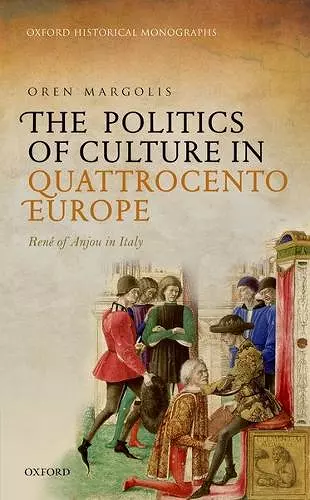The Politics of Culture in Quattrocento Europe
René of Anjou in Italy
Format:Hardback
Publisher:Oxford University Press
Published:5th May '16
Currently unavailable, and unfortunately no date known when it will be back

The poet-king without a throne appears here in an entirely new light. In The Politics of Culture in Quattrocento Europe: René of Anjou in Italy, Oren Margolis explores how this French prince and exiled king of Naples (1409-1480) engaged his Italian network in a programme of cultural politics conducted with an eye towards a return to power in the peninsula. Built on a series of original interpretations of humanistic and artistic material (chiefly Latin orations and illuminated manuscripts of classical texts), this is also a case study for a 'diplomatic approach' to culture. It recasts its source base as a form of high-level communication for a hyper-literate elite of those who could read the works created by humanist and artistic agents for their constituent parts: the potent words or phrases and relevant classical allusions; the channels through which a given work was commissioned or transmitted; and then the nature of the network gathered around a political agenda. This is a volume for all those interested in the politics and culture of later medieval Europe and Renaissance Italy: the kings of France and dukes of Burgundy, the Medici, the Sforza, the Venetians, and their armies, ambassadors, and adversaries all appear here; so do Giovanni Bellini, Andrea Mantegna, Guarino of Verona, and their respective intellectual and artistic circles. Emerging from it is a challenge to conventional interpretations of the politics of humanism, and a new vision of the Quattrocento: a century in which the Italian Renaissance began its takeover of Europe, but in which Renaissance culture was itself shaped by its European political, social, and diplomatic context.
With its attention both to close detail and to wider implications, Margolis' monograph is an unquestionable success. * David Rundle, English Historical Review *
This is a fascinating study of René of Anjou, an exiled ruler without a kingdom. Utilizing network analysis to excellent effect, Margolis has written a sophisticated study of René's development of Italian networks, all designed to help him return to power. Margolis demonstrates how such cultural products as illuminated manuscripts and Latin orations functioned as the means of cultural diplomacy between members of what he terms the 'hyper-literate' elite. Communication is thus seen to transcend the literary objects upon which it is based, allowing a heightened communication with real political intent. This is a sophisticated and subtle study of the politics of Angevin cultural networks. * Comments from the judges of the 2017 Gladstone Prize *
[a] detailed and meticulously researched study * Douglas Biow, European History Quarterly *
The Politics of Culture in Quattrocento Europe: René of Anjou in Italy is a well-written and impressively researched book in which long-standing views of Renaissance cultural politics and diplomacy are re-examined from a new perspective, while René of Anjou himself emerges from this work as a talented, flawed, and often unlucky man whose quest for his lost crown created a network of influence that had a lasting impact in Quattrocento Europe. * Joseph Lombardi, Society for Renaissance Studies *
Margolis' engaging book will interest a wide range of scholars as it skilfully blends diplomacy and cultural history with a close study of artworks and humanist texts. * Nirit Ben-Aryeh Debby, Sehepunkte *
it is this more serious, more political René that Margolis highlights in this important corrective to French and English stereotypes ... This is a book which brings out a very different René from the nostalgic dreamer whose image was promoted by, say, a Huizinga: René is, ultimately, a failure, but those courtly pretensions are intended not simply for decorative purposes, but for political ones: it is an image which, as scholars of chivalric society at the end of the Middle Ages, we need to absorb. * Jane H. M. Taylor, Medium Aevum *
a rich and inspiring book ... [Margolis] propagates a new approach to art, literature, and politics, which turns away from any kind of cult of genius and instead puts networks of artists, writers, and patrons and the political significance of their works in the foreground. * Christina Antenhofer, Zeitschrift für historische Forschung [translated] *
- Winner of Awarded the 2017 Gladstone Prize proxime accessit by the Royal Historical Society.
ISBN: 9780198769323
Dimensions: 227mm x 145mm x 19mm
Weight: 398g
240 pages